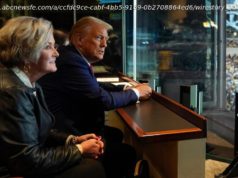The ongoing impact of Harvey, where Trump is clashing with Tillerson, why North Korea sent a missile over Japan, and more
Responses to Harvey: After being criticized for his lack of empathy toward Hurricane Harvey victims Tuesday, President Trump expressed compassion for those affected in Texas in prepared remarks ahead of a speech on tax reform. While he acknowledged recovery would be a tough process, lawyers in Houston got to work helping victims of the storm who might face challenges from landlords and bureaucratic systems. More roadblocks wait down the road, with the psychological and academic impact on schoolchildren —who tend to be particularly affected by these types of extreme events —yet to be seen.
State Dept. Struggles: Though Secretary of State Rex Tillerson is getting heavy criticism for his plan to eliminate nine special envoy positions, diplomats inside his department have long been skeptical of the utility of such positions. Tillerson is also clashing with the White House over whether to sanction Venezuela for its authoritarian actions—which illustrates the rifts in the Trump administration’s foreign policy.
Missile Message: North Korea’s test of an ICBM over Japan had important strategic value for Pyongyang: Not only does the threat send a message to the U. S., it also may lead Japan to question the risks of an American alliance. Amid high stakes and high tension, Trump has warned he’s considering all options, but he can’ t start a war against North Korea without approval from Congress.
— Rosa Inocencio Smith
Joy Lanzendorfer on the lack of women in music production and sound engineering careers:
In 2000, the Audio Engineering Society’s (AES) women in audio committee—which is now, tellingly, defunct—loosely estimated that 5 percent of those working in the field were female. A 2016 survey by AES found 7 percent of its members were women, though that number is incomplete because participants could opt out of reporting their gender. According to Women’s Audio Mission, a nonprofit that trains women for sound careers, that number is probably lower. With men holding the vast majority of technical jobs in audio, it follows that virtually all the music we hear—on the radio, over headphones, or in a live venue—has been shaped by a man.
Keep reading here, as Lanzendorfer looks at the history and future of women in the audio industry.
According to one astrobiologist, Hurricane Harvey represents the new bargain humanity has struck with nature: Our technological advancement wreaks environmental havoc, but also enables us to better prepare for natural disasters. Despite the $100 million per year that Houston spends on flood control, the consequences of the rainiest hurricane ever measured in the Atlantic Ocean have been dire. Texans are not only stranded by flooding, but are also facing floating colonies of fire ants, and even after the waters recede, mold and mosquitoes could continue to plague the area.
Can you remember the other key facts from this week’s science, tech, and health coverage? Test your knowledge below:
1. After England started taxing playing cards in 1765, forging an ____________ was a crime punishable by death.
Scroll down for the answer, or find it here .
2. Astronomers discovered that the planet ____________ had rings in 1977.
Scroll down for the answer, or find it here .
3. In 1992, the contents of the Golden Record were released in ____________ format.
Scroll down for the answer, or find it here .
— Rachel Gutman
Answers: ace / uranus / cd-rom
You have one day left to submit to our Instagram contest! By the end of the day August 31, tag a photo of your September issue with #ReadingMyAtlantic to enter, and be sure to follow us on Instagram to see the winning photo announced early next month.
Huey Long, the infamous populist governor and senator of Louisiana, was born on this day in 1893. In our April 1940 issue, David L. Cohn described his role in the state’s history:
Liberty means far less to thousands of Americans than many of us would like to believe. Freedom of speech to the bitterly poor of Louisiana was merely the freedom to grumble over their lot; the right of free movement was the right to shift from one foot to another as they looked for a job; the right of free assembly was to assemble in church and pray that in heaven they would be granted that which was denied them on Earth. These “rights” they were willing to swap for a sack of corn meal, a side of meat, a pair of shoes.
It was therefore relatively easy for Huey Long, with a mind as superior to that of the local politicians and patricians as the elephant’s is to the flea’s, to come upon the scene and, with his tireless energy, his extraordinary resourcefulness, his superior showmanship, greater ruthlessness, more flamboyant promises, keener understanding of the mass mind, to buy the legislature, pack the courts, and win the elections.
Read more here .
After Jon Emont wrote about the challenges of starting a new religious movement, Roxana explains why she finds one such movement, following the Urantia Book, compelling:
When I was around 12 years old, I attended a Christian church summer camp for a week. My group leader learned I had never been baptized. She wanted me to accept Christ as my savior or I risked going to Hell. I asked her about all the people in the world, like Buddhists or Jews or atheists or Muslims, who didn’ t believe in Christ—were they all going to go to Hell? I couldn’ t believe a loving God would do that to his children. I still don’ t believe that. I do believe in the Urantia Book because I find its message logical, cohesive, reassuring, and even scientific. It is beautifully written.
See more readers’ responses on what attracts them to new religious movements here, and find a related discussion on religious choices here .
Cosmic mystery solved, cancer treatment approved, “Brexodus” anticipated, competition reheated .
Happy birthday to Tristan’s father, Tapio (born around the time Thurgood Marshall was appointed to the Supreme Court) ; to Neil’s child Micah (a year younger than the International Space Station) ; to Sarah’s mother, Sue (born around the time of the fourth Geneva Convention) ; to Tom’s wife (a year younger than the Super Bowl) ; and to Jane’s son Lucas (the same age as Wikipedia) .






